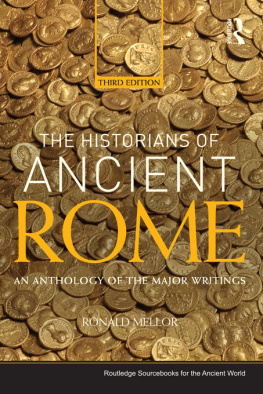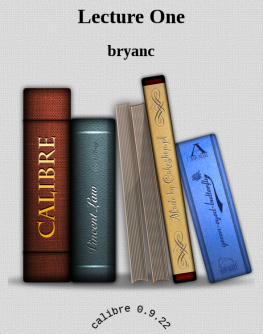Titus Livius - Roman History: Books I - III
Here you can read online Titus Livius - Roman History: Books I - III full text of the book (entire story) in english for free. Download pdf and epub, get meaning, cover and reviews about this ebook. publisher: Duke Classics, genre: History. Description of the work, (preface) as well as reviews are available. Best literature library LitArk.com created for fans of good reading and offers a wide selection of genres:
Romance novel
Science fiction
Adventure
Detective
Science
History
Home and family
Prose
Art
Politics
Computer
Non-fiction
Religion
Business
Children
Humor
Choose a favorite category and find really read worthwhile books. Enjoy immersion in the world of imagination, feel the emotions of the characters or learn something new for yourself, make an fascinating discovery.
- Book:Roman History: Books I - III
- Author:
- Publisher:Duke Classics
- Genre:
- Rating:4 / 5
- Favourites:Add to favourites
- Your mark:
- 80
- 1
- 2
- 3
- 4
- 5
Roman History: Books I - III: summary, description and annotation
We offer to read an annotation, description, summary or preface (depends on what the author of the book "Roman History: Books I - III" wrote himself). If you haven't found the necessary information about the book — write in the comments, we will try to find it.
Titus Livius, often known as Livy in English, was a Roman historian who wrote a monumental history of Rome, Ab Urbe Condita, from its founding (traditionally dated to 753 BC) through the reign of Augustus in Livys own time. Livys writing style was poetic and archaic in contrast to Julius Caesars and Ciceros styles. Also, he often wrote from the Romans opponents point of view in order to accent the Romans virtues in their conquest of Italy and the Mediterranean. In keeping with his poetic tendencies, he did little to distinguish between fact and fiction. Although he frequently plagiarized previous authors, he hoped that moral lessons from the past would serve to advance the Roman society of his day.
Roman History: Books I - III — read online for free the complete book (whole text) full work
Below is the text of the book, divided by pages. System saving the place of the last page read, allows you to conveniently read the book "Roman History: Books I - III" online for free, without having to search again every time where you left off. Put a bookmark, and you can go to the page where you finished reading at any time.
Font size:
Interval:
Bookmark:

Books I-III
From a 1904 edition
ISBN 978-1-62011-171-0
Duke Classics
2012 Duke Classics and its licensors. All rights reserved.
While every effort has been used to ensure the accuracy and reliability of the information contained in this edition, Duke Classics does not assume liability or responsibility for any errors or omissions in this book. Duke Classics does not accept responsibility for loss suffered as a result of reliance upon the accuracy or currency of information contained in this book.
Of the lost treasures of classical literature, it is doubtful whetherany are more to be regretted than the missing books of Livy. Thatthey existed in approximate entirety down to the fifth century, andpossibly even so late as the fifteenth, adds to this regret. At thesame time it leaves in a few sanguine minds a lingering hope that someunvisited convent or forgotten library may yet give to the world awork that must always be regarded as one of the greatest of Romanmasterpieces. The story that the destruction of Livy was effected byorder of Pope Gregory I, on the score of the superstitions containedin the historian's pages, never has been fairly substantiated, andtherefore I prefer to acquit that pontiff of the less pardonablesuperstition involved in such an act of fanatical vandalism. That thebooks preserved to us would be by far the most objectionable fromGregory's alleged point of view may be noted for what it is worth infavour of the theory of destruction by chance rather than by design.
Here is the inventory of what we have and of what we might have had.The entire work of Livya work that occupied more than forty yearsof his lifewas contained in one hundred and forty-two books, whichnarrated the history of Rome, from the supposed landing of neas,through the early years of the empire of Augustus, and down to thedeath of Drusus, B.C. 9. Books I-X, containing the story of earlyRome to the year 294 B.C., the date of the final subjugation of theSamnites and the consequent establishment of the Roman commonwealth asthe controlling power in Italy, remain to us. These, by the acceptedchronology, represent a period of four hundred and sixty years. BooksXI-XX, being the second "decade," according to a division attributedto the fifth century of our era are missing. They covered seventy-fiveyears, and brought the narrative down to the beginning of the secondPunic war. Books XXI-XLV have been saved, though those of the fifth"decade" are imperfect. They close with the triumph of milius, in 167B.C., and the reduction of Macedonia to a Roman province. Of the otherbooks, only a few fragments remain, the most interesting of which(from Book CXX) recounts the death of Cicero, and gives what appearsto be a very just estimate of his character. We have epitomes of allthe lost books, with the exception of ten; but these are so scanty asto amount to little more than tables of contents. Their probable dateis not later than the time of Trajan. To summarize the result, then,thirty-five books have been saved and one hundred and seven lostamost deplorable record, especially when we consider that in the laterbooks the historian treated of times and events whereof his means ofknowledge were adequate to his task.
TITUS LIVIUS was born at Patavium, the modern Padua, some time between61 and 57 B.C. Of his parentage and early life nothing is known. Itis easy to surmise that he was well born, from his political bias infavour of the aristocratic party, and from the evident fact of hishaving received a liberal education; yet the former of these argumentsis not at all inconsistent with the opposite supposition, and thelatter should lead to no very definite conclusion when we rememberthat in his days few industries were more profitable than the highereducation of slaves for the pampered Roman market. Niebuhr infers,from a sentence quoted by Quintilian, that Livy began life as ateacher of rhetoric. However that may be, it seems certain that hecame to Rome about 30 B.C., was introduced to Augustus and won hispatronage and favour, and after the death of his great patron andfriend retired to the city of his birth, where he died, 17 A.D. Itis probable that he had fixed the date of the Emperor's death as thelimit of his history, and that his own decease cut short his task.
No historian ever told a story more delightfully. The availabletranslations leave much to be desired, but to the student of LatinLivy's style is pure and simple, and possesses that charm which purityand simplicity always give. If there is anything to justify the chargeof "Patavinity," or provincialism, made by Asinius Pollio, we, atleast, are not learned enough in Latin to detect it; and Pollio, too,appears to have been no gentle critic if we may judge by his equallysevere strictures upon Cicero, Csar, and Sallust. This much we know:the Patavian's heroes live; his events happen, and we are carriedalong upon their tide. Our sympathies, our indignation, ourenthusiasm, are summoned into being, and history and fiction appear towalk hand in hand for our instruction and amusement. In this latterwordfictionlies the charge most often and most strongly madeagainst himthe charge that he has written a story and no more; thatwith him past time existed but to furnish materials "to point a moralor adorn a tale." Let us consider to what extent this is true, and, iftrue, in what measure the author has sinned by it or we have lost.
No one would claim that the rules by which scientific historians ofto-day are judged should be applied to those that wrote when historywas young, when the boundaries between the possible and the impossiblewere less clearly defined, or when, in fact, such boundaries hardlyexisted in men's minds. In this connection, even while we vaunt, wesmile. After all, how much of our modern and so-called scientifichistory must strike the reasoning reader as mere theorizing or asspecial pleading based upon the slenderest evidence! Among theancients the work of the historians whom we consider trustworthysuchwriters, for instance, as Csar, Thucydides, Xenophon, Polybius, andTacitusmay be said to fall generally within Rawlinson's canons 1 and2 of historical criticismthat is, (1) cases where the historian haspersonal knowledge concerning the facts whereof he writes, or (2)where the facts are such that he may reasonably be supposed to haveobtained them from contemporary witnesses. Canon 2 might be elaboratedand refined very considerably and perhaps to advantage. It naturallyincludes as sources of knowledgefirst, personal interviews withcontemporary witnesses; and, second, accesses to the writings ofhistorians whose opportunities brought them within canon 1. In thislatter case the evidence would be less convincing, owing to the lackof opportunity to cross-question, though even here apparent lack ofbias or the existence of biased testimony on both sides, from which ajudicious man might have a fair chance to extract the truth, would gofar to cure the defect.
The point, however, to which I tend is, that the portions of Livy'shistory from which we must judge of his trustworthiness treat, for themost part, of periods concerning which even his evidence was of thescantiest and poorest description. He doubtless had family records,funeral panegyrics, and inscriptionall of which were possibly almostas reliable as those of our own day. Songs sung at festivals andhanded down by tradition may or may not be held more truthful. Thesehe had as well; but the government records, the ancient fasti, hadbeen destroyed at the time of the burning of the city by the Gauls,and there is no hint of any Roman historian that lived prior to thedate of the second Punic war. Thus we may safely infer that Livy wroteof the first five hundred years without the aid of any contemporaryevidence, either approximately complete or ostensibly reliable. Withthe beginning of the second Punic war began also the writing ofhistory. Quintus Fabius Pictor had left a work, which Polybiuscondemned on the score of its evident partiality. Lucius CinciusAlimentus, whose claim to knowledge if not to impartiality restslargely on the fact that he was captured and held prisoner byHannibal, also left memoirs; but Hannibal was not famous for treatingprisoners mildly, and the Romans, most cruel themselves in thisrespect, were always deeply scandalized by a much less degree ofharshness on the part of their enemies. Above all, there was Polybiushimself, who perhaps approaches nearer to the critical historian thanany writer of antiquity, and it is Polybius upon whom Livy mainlyrelies through his third, fourth, and fifth decades. The works ofFabius and Cincius are lost. So also are those of the LacedaemonianSosilus and the Sicilian Silanus, who campaigned with Hannibal andwrote the Carthaginian side of the story; nor is there any evidencethat either Polybius or Livy had access to their writings. Polybius,then, may be said to be the only reliable source from which Livy coulddraw for any of his extant books, and before condemning unqualifiedlyin the cases where he deserts him and harks back to Roman authoritieswe must remember that Livy was a strong nationalist, one of a peoplewho, despite their conquests, were essentially narrow, prejudiced,egotistical; and, thus remembering, we must marvel that he so fullyrecognises the merit of his unprejudiced guide and wanders as littleas he does. All told, it is quite certain that he has dealt morefairly by Hannibal than have Alison and other English historians byNapoleon. His unreliability consists rather in his conclusions than inhis facts, and it is unquestioned that through all the pages ofthe third decade he has so told the story of the man most hated byRomethe deadliest enemy she had ever encounteredthat the readercan not fail to feel the greatness of Hannibal dominating everychapter.
Font size:
Interval:
Bookmark:
Similar books «Roman History: Books I - III»
Look at similar books to Roman History: Books I - III. We have selected literature similar in name and meaning in the hope of providing readers with more options to find new, interesting, not yet read works.
Discussion, reviews of the book Roman History: Books I - III and just readers' own opinions. Leave your comments, write what you think about the work, its meaning or the main characters. Specify what exactly you liked and what you didn't like, and why you think so.









